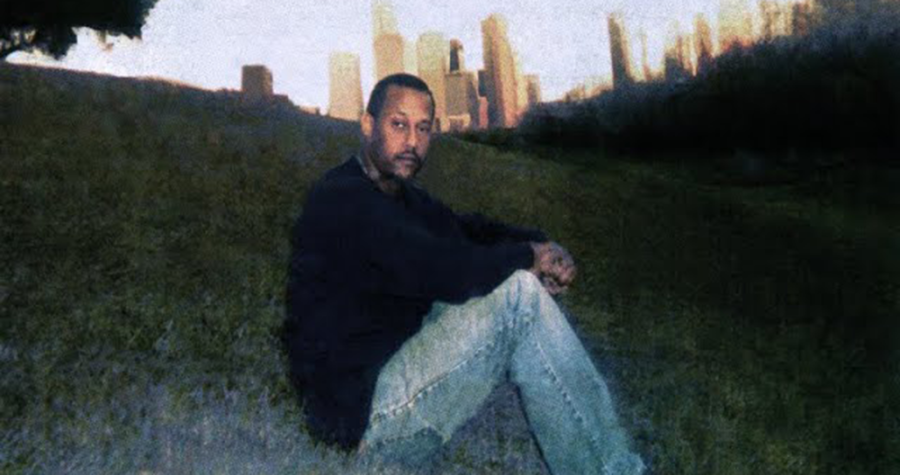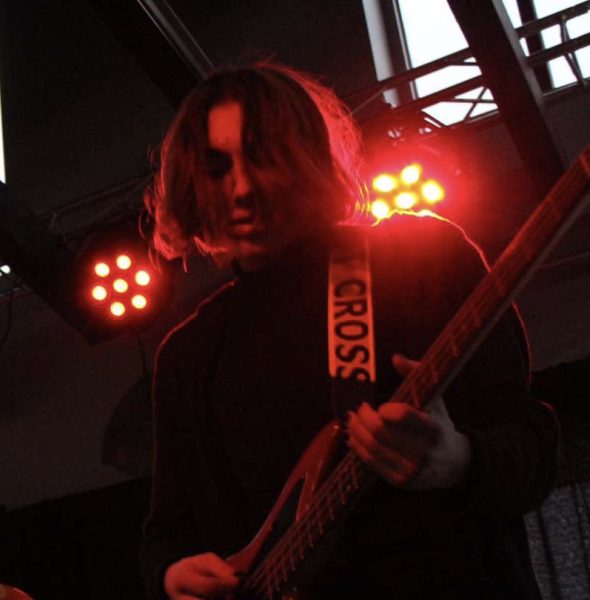Cloud Rap: Maybe One Day We’ll See It Again
April 24, 2023
It’s 3:00 AM at a local gas station on the way back home from a vacation, the pumps have no one occupying them, and there’s no one in sight inside of the gas station — besides an employee with a wrinkled face and graying hair, you think he’s someone you’ve met before, but you never have — he’s just familiar. You go inside and hazelly purchase an energy drink and overpriced beef jerky. After having a half-baked conversation about your night with the employee and walking outside, you stop in your tracks and bask in the liminality of the atmosphere around you. Your eyes track back and forth through the dark blanketing shy, complemented by the thick warm southern night air. You cannot quite help but feel a sense of dread — mixed with nostalgia, it’s a familiar feeling, fleeting, but evaporating slowly. To counter the dreadful nature of the area, you put your earbuds in and turn your playlist on — you skip song after song and finally, you settle on Location by Playboi Carti, standing in the dark as you contemplate how you got there.
What is Cloud Rap?
Rap is no stranger to subgenres, they have existed since the dawn of the genre with genres typically being decided by the area in the music was being made. However, as time went on more and more genres began to emerge — such as boom rap and jazz rap, which would in their own create more and more subgenres. Out of the extensive repertoire of subgenres, one spear fronted its own cult-like underground following: Cloud rap.
Cloud rap was a subgenre born from two other subgenres — Trap (dark-sounding beats with fast complex high hats with lyrical content focusing on drug usage) and Lo-Fi Hip Hop (A style of production focusing on low-quality mixing that tends to feel calming). However, what sets cloud rap apart from these other genres is its hazy and dreamlike atmosphere via the usage of nostalgic samples and saturated synths — sounds that feel familiar but aren’t — songs that make you feel like you’re ascending through clouds and then floating in space. Many people have been cited in creating this genre, but unlike most genres, it’s hard to link it back to who did it first when there is such a convoluted history to the genre.
Clouddead – Self Titled (2001)
The most debated “cloud rap album” is Clouddead’s self-titled release in 2001, which is often cited as the first cloud rap album by many. The album was, in its whole, an overlooked piece of hip-hop history with it experimenting with sound collages and dreamlike atmospheres. This album feels very nostalgic and that’s its main contribution to the genre. The main goal of this album was to be an “advancement towards hip-hop” in light of the “crime-filled” genre at the time. Despite how tone-deaf this aspiration was, it did indirectly do what it was meant to do years after its release. I would personally not consider this album cloud rap due to it pretty much not being hip hop, it is barely even rap. Sure, it would influence the genre and set the ambient roots to the genre, but it didn’t have the rap attributes that the genre typically expressed, something that would not be expressed until a thirty five year old man in Houston would accidentally create a whole movement of music.
Viper: An Unsung Hero of Hip-Hop
[Authors edit (1/9/2024): This article was written half a year prior to new allegations that have come out against this artist, The Paw Prints does not endorse this man’s actions — we are only archiving and recording the impact of his art.]
While the world was basking in the glory of Kanye’s 2005 Late Registration, Lee Arthur Carter was paving his own road. In 2006, Lee (otherwise known as Viper) would put out “Ready… And WIlling”, an album that would be otherwise overlooked until seven years after it was released. The album instantly greeted the listener with a reversed instrumental for a beat and a low-sounding voice delivering lyrics about topics that were frequently discussed in gangster rap and trap: crime, drugs, gang culture, and hustling. Despite these intense topics, you cannot help but feel a sense of warmth and calm from his music.
In 2008, Viper would release what many consider his magnum opus “The Hiram Clarke Hustler” — which was the most refined album of his at the time. Instead of relying on reversed samples, he would create dreamy beats (hazy synths drenched with reverberation and tape saturation) and sample RNB songs — like the song “Hey, Maybe One Day You’ll See Me Again”, of which samples the ending to “My Place” by T-Pain — looping it over and over. The song is doused with bits of haunting vocal chops that add a psychedelic texture to the song, a theme that would become common in the genre. Viper also mixed his vocals to be the same volume as the beat, using his vocals as more of an instrument — another concept that would become a key feature in cloud rap. “Sensitive” rap was not unheard of, with earlier Kanye songs being released around the same time, but Viper approached this concept with a new lens. Mixing traditional hip-hop gloating with vaguely relatable concepts and melancholy stories, Viper gave a new lens to the traditional “gangster” persona portrayed by rappers of the time. However, Viper would have the label of the founder of cloud rap ripped from his arms without knowing by someone who would send the genre even further.
The Rise of Based God
In the vague footsteps of Viper came two artists: Rapper Lil B and producer Clams Casino. Lil B. Lil B came out of the ashes of Bay Area skate-rap, a subgenre of hip-hop that basks in calm beats with sampled abrasive drum breaks. Lil B, after leaving his old rap group called “The Pack” he put out a solo album, “ImThraxx”, in 2009 — an album that would permanently transform the landscape of hip hop until this day.
ImThraxx would introduce many new concepts to hip hop with the most prominent thing being introduced is the terminology used by Lil B. LIl B would effectively implement the word “based” into popularity, a word that meant, according to him: “being yourself and not caring what others think of you”. This word was a reclamation from its original meaning in slang, originally used to describe someone as stupid. Lil B would also popularize the usage of the word “swag”, a word put into slang by JayZ and slightly popularized by Souljaboy.
In an interview in 2009, Lil B was asked by a musical journalist (Noz) about the artistry that Lil B wanted to make — Lil B did not say a word for a good minute and pulled out a poorly made CGI image of a castle amongst many clouds. Something that looked nostalgic, yet somewhere heavenly that no one has ever been. “That’s the kind of music I want to make,” Lil B said with stern emotion in his voice — however he did not realize one thing, he just created the genre of cloud rap.
The connecting piece between Lil B, cloud rap, and mainstream hip hop is one producer who was briefly mentioned earlier: Clams Casino. Clams Casino, 23 at the time in 2010, sent Lil B an email with a beat on it — thinking that the rapper would just write it off and would not utilize it. However, to his disbelief — the rapper would then use the heavenly beat, creating the track “I’m God”, a track that would push influence onto a whole new generation of rap. Clam would gain recognition due to this track and more artists would start reaching out to him. One of these artists would push this genre into the mainstream charts in the U.S. ASAP Rocky.
ASAP Rocky, Carti, and Drain Gang
The first real taste of mainstream success that cloud rap would see is 2011’s “Live. Love. A$AP” — a mixtape that was met right away with an 8.2 by Pitchfork. The most prominent feature of this album is the production by Clams Casino — similar to his production seen on Lil B, but more prolific and fleshed out as if Clams had finally perfected his hazy production. If Lil B’s ImThraxx was the old testament, then “Live. Love. A$AP” would essentially be the new testament of cloud rap. This album was met with applause from community after community, however, it was met with some criticism. Hodgy, a member of the rap collective Odd Future, called him “A$AP Copy”. But, overall, the criticisms were overshadowed by the waves of enjoyment by the masses. So much so that many new artists were directly pushed out into the mainstream in the mid-2010s. In 2017, Playboi Carti would release his self-titled release of which would also transform the genre. Carti creatively took two genres, trap and cloud rap, and mixed them together — beautifully blending two genres that should not work. The tracks “Location” and “Magnolia” perfectly represent the transformation of these genres with masterfully crafted beats by Pierre Bourne (A producer prominent in trap, who would then become very impactful in most subgenres of rap). Carti would accidentally create so many clones of himself via his fans — people trying to imitate his style to a T, bringing us to modern times. However, the future of the genre as a whole was being transformed across the pond in Sweden.
Yung Lean, a fifteen year old Swedish rapper, released Ginseng Strip 2002 in 2013 — coming completely out of nowhere with his music and indirectly creating a new music scene across the world. While America was focused on bigger mainstream trap artists, Lean was putting together a whole community. His music was notably sadder and colder than most music — with concepts of drugs and depression being key focuses in his music (this would also create emo rap). Taking note of his style, Bladee (Lean’s friend’s younger brother) would start making music similar to Lean. However, Bladee was calmer and more obscure lyrically — taking support from artists like Ecco2k to create dreamlike and eternal instrumentals with his vocals cutting through. Bladee and his musical collective, Drain Gang, would continue cloud rap to where it is today. While other artists mentioned previously have pushed into other genres, Drain Gang has continued to stay linked to the genre. While many have said the genre has effectively died in the light of newer concepts, many pray for it to come back and believe it’ll reconstruct itself. Maybe one day we’ll see it again.
ALBUM RECOMMENDATIONS:
One Day You’ll See Me Again – Viper (My personal favorite in the genre, a great compilation album)
Live love ASAP
Playboi Carti – Playboi Carti
God’s Father by Lil B
Icedancer – Bladee
E – Ecco2k
Warlord – Yung Lean
Early Works Bootleg – Yabujin (More extreme experimentally, but it’s amazing)




